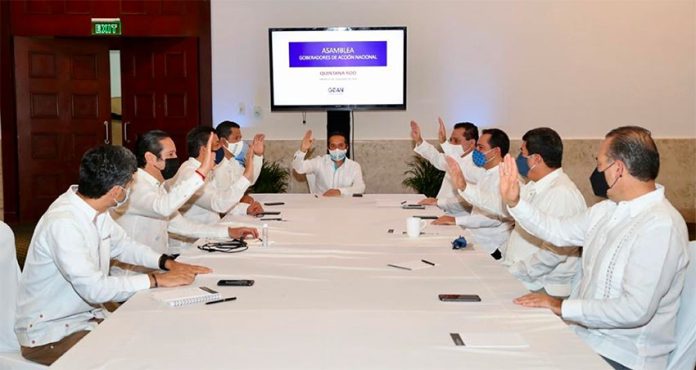Mandatory face masks and increased Covid-19 testing are among five measures Mexico’s nine National Action Party (PAN) governors have agreed to implement to combat the coronavirus pandemic.
The governors of Aguascalientes, Baja California Sur, Chihuahua, Durango, Guanajuato, Querétaro, Quintana Roo, Tamaulipas and Yucatán announced that a common health policy will be implemented in the nine states due to the imminent arrival of winter at a time when the country is experiencing a “serious increase” in coronavirus case numbers.
The five pillars of the policy are the mandatory use of face masks, increased Covid-19 testing, improved contact tracing, the strengthening of social distancing measures and preparation for the timely application of vaccines.
In a video message, Diego Sinhue of Guanajuato said that Mexico’s coronavirus statistics – more than 1.2 million confirmed cases and over 112,000 deaths as of Thursday – are “very concerning,” asserting that they are indicative of a “humanitarian tragedy unparalleled in the country’s history.”
“The states governed by the PAN are taking the decision to work with complete seriousness based on scientific knowledge to protect families’ health,” he said.
Francisco García of Tamualipas said that the use of face masks will be obligatory in all public spaces in the nine PAN states. He said that each state will announce specific rules for their use and sanctions for those who don’t comply.
“The best vaccine we have to this day is to use a face mask and [maintain] permanent hygiene,” he said.
Carlos Mendoza Davis of Baja California Sur said the PAN states will substantially increase Covid-19 testing.
“Mexico is in 156th place in the world for the application of Covid tests,” he said. “In this way, we can’t see the true magnitude of the pandemic nor confront it successfully.”
Mendoza said that just 9.7 tests per 100,000 residents are performed per day on average while the average in PAN states is 14.1.
“The objective is to at least double this number and we’ll do it via tests at home, [testing] workers at businesses and [performing] random tests of the population in general,” he said.
Francisco Domínguez of Querétaro said the third pillar of the new health policy is the “expansion of data tracing networks.”
Widespread testing and timely contact tracing have been hallmarks of the strategies of the countries that have had the greatest success in controlling the pandemic, he said.
“We will increase the efforts that are already underway [in the PAN states],” Domínguez said.
Referring to measures to strengthen social distancing, Martín Orozco of Aguascalientes said that celebrations for the Day of the Virgin (December 12), Christmas posadas and all other social gatherings to mark the end of the year are prohibited.
“Let’s celebrate but at home and only with our families. Let’s all look after each other, especially our senior citizens,” he said, adding that “complaint centers” where people can report violations of the ban will be established.
Finally, José Rosas Aispuro of Durango said PAN states will work together to ensure that vaccines – when they arrive – are administered as quickly as possible.
He said the National Action governments have started working to identify people who qualify for early access to vaccination, including people vulnerable to a serious Covid-19 illness.
“We’re ready to provide and train the personnel that are required to apply the vaccines,” Rosas added.
The nine PAN governors have been critical of the pandemic response by the federal government, which has sent mixed messages about the efficacy of face masks, rejected the importance of widespread testing and refused to enforce a strict lockdown in the early months of the coronavirus outbreak.
Source: Expansión Política (sp)
